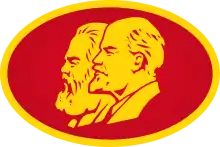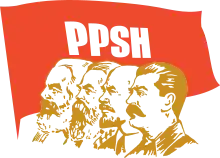Hoxhaism
Hoxhaism (English: /ˈhɒdʒə.ɪzəm/) is a variant of anti-revisionist Marxism–Leninism that developed in the late 1970s due to a split in the Maoist movement, appearing after the ideological dispute between the Communist Party of China and the Party of Labour of Albania in 1978.[1] The ideology is named after Enver Hoxha, a notable Albanian communist leader, who served as the First Secretary of the Party of Labour.
| Part of a series on |
| Marxism–Leninism |
|---|
 |
|
| Part of a series on |
| Stalinism |
|---|
 |
|

Overview

Hoxhaism demarcates itself by a strict defense of the legacy of Joseph Stalin, the organization of the Soviet Union under Stalinism,[2] and fierce criticism of virtually all other communist groupings as "revisionist"—it defines currents such as Eurocommunism as anti-communist movements.
Critical of the United States, the Soviet Union, China, and Yugoslavia, Enver Hoxha labeled the latter three "social imperialist" and condemned the Soviet invasion of Czechoslovakia in 1968, before withdrawing Albania from the Warsaw Pact in response. Hoxhaism asserts the right of nations to pursue socialism by different paths, dictated by the conditions in those countries,[3] although Hoxha personally held the view that Titoism was "anti-Marxist" in overall practice.[4]
The Albanians succeeded in ideologically winning over a large share of Maoists, mainly in Latin America (such as the Popular Liberation Army and the Marxist-Leninist Communist Party of Ecuador as well as the Revolutionary Communist Party of Brazil), but they also had a significant international following in general.
Following the fall of the People's Socialist Republic of Albania in 1991, the Hoxhaist parties grouped themselves around an international conference founded in 1994 and the publication Unity and Struggle.
List of Hoxhaist parties
Active
- Albania: Communist Party of Albania, Reorganised Party of Labour of Albania
- Benin: Communist Party of Benin, Marxist–Leninist Communist Party of Benin
- Bolivia: Revolutionary Communist Party
- Brazil: Revolutionary Communist Party
- Burkina Faso: Voltaic Revolutionary Communist Party
- Canada: Communist Party of Canada (Marxist–Leninist)
- Chile: Chilean Communist Party (Proletarian Action)
- Colombia: Communist Party of Colombia (Marxist–Leninist), Popular Liberation Army (guerrilla group)
- Côte d'Ivoire: Revolutionary Communist Party of Côte d'Ivoire
- Denmark: Workers' Communist Party
- Dominican Republic: Communist Party of Labour
- Ecuador: Marxist–Leninist Communist Party of Ecuador (Group of Popular Combatants)
- France: Workers' Communist Party of France
- Greece: Movement for the Reorganization of the Communist Party of Greece 1918–1955
- India: Communist Ghadar Party of India
- Iran: Labour Party of Iran
- Italy: Communist Platform
- Mali: Malian Party of Labour
- Mexico: Communist Party of Mexico (Marxist–Leninist)
- Nicaragua: Marxist–Leninist Popular Action Movement
- Spain: Communist Party of Spain (Marxist–Leninist), Marxist–Leninist Party (Communist Reconstruction)
- Togo: Communist Party of Togo
- Tunisia: Workers' Party
- Turkey: Revolutionary Communist Party of Turkey, Marxist–Leninist Communist Party
- United Kingdom: Revolutionary Communist Party of Britain (Marxist–Leninist)
- United States: American Party of Labor, U.S. Marxist–Leninist Organization
- Venezuela: Marxist–Leninist Communist Party of Venezuela and Red Flag Party
Historical
- Albania: Party of Labour of Albania
- Bolivia: Communist Party (Marxist–Leninist) of Bolivia
- Brazil: Revolutionary Communist Party (Brazil)
- Denmark: Communist Party of Denmark/Marxist–Leninists
- Ethiopia: Marxist–Leninist League of Tigray, Tigray People's Liberation Front, Ethiopian People's Revolutionary Democratic Front
- Faroe Islands: Advancement for the Islands (Marxist–Leninist)
- Germany: Communist Party of Germany/Marxists–Leninists, Communist Party of Germany (Roter Morgen)
- Greece: Organisation of Communists Marxists–Leninists of Greece
- Iceland: Communist Unity (Marxist–Leninist)
- Ireland: Communist Party of Ireland (Marxist–Leninist)
- Italy: Organization for the Communist Party of the Proletariat of Italy
- Japan: Japanese Communist Party (Left Faction)
- Netherlands: Workers Party of the Netherlands (build-up organisation)
- New Zealand: Communist Party of New Zealand
- Norway: Communist Workers League, Marxist–Leninist League, Marxist–Leninist Group Revolution
- Portugal: Communist Party (Reconstructed)
- Spain: Communist Party of Spain (Marxist–Leninist)
- Suriname: Communist Party of Suriname
- Sweden: Communist Party in Sweden
- Trinidad and Tobago: Communist Party of Trinidad and Tobago
- Turkey: Communist Party of Turkey/Marxist–Leninist – Movement
- United Kingdom: Communist League of Great Britain
- United States: Revolutionary Organization of Labor, Marxist–Leninist Party, USA
- Venezuela: Red Flag Party
See also
References
- Communism for Know-It-Alls. Filiquarian Publishing, LLC. 2008. p. 23.
- Pridham, Geoffrey (2000). The Dynamics of Democratization: A Comparative Approach. Bloomsbury Publishing. p. 70.
- "A Brief Guide to Hoxhaism". The Red Star Vanguard. Retrieved 23 May 2014.
- Hoxha, Enver. "Enver Hoxha: Eurocommunism is Anticommunism". Retrieved 23 May 2014.
External links
- enver-hoxha.net
- Enver Hoxha multilingual website
- Enver Hoxha. His life and his works
- Communist International (Stalinist-Hoxhaist)
- Revolutionary Democracy
- "Alliance!" Marxist-Leninist (North America)
- The Espresso Stalinist
- Enver Hoxha Archive
